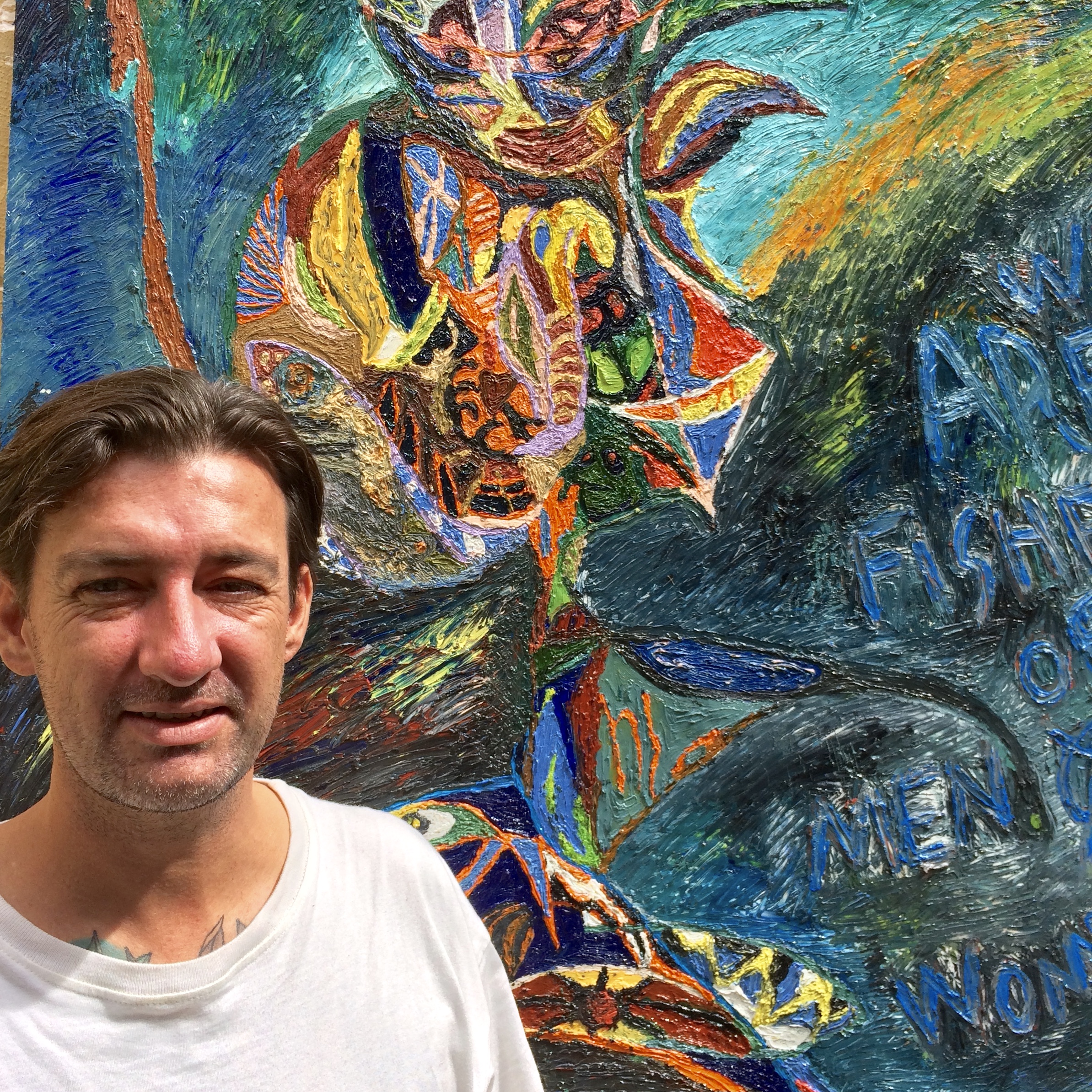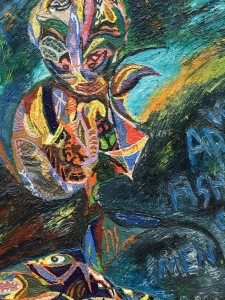I met Trent at the Close the Gap event in Brisbane’s West End. There was a dynamic vibrant painting hanging on one of the walls of the enclosed park and I’d asked around about the artist. I found Trent stacking chairs in a store room. Trent does a lot of painting now, many of which he donates, and he and his brother run a community art workshop in West End, but he was once homeless. We started talking and I immediately came to admire this man who is building belonging for other people out of the history of his own adversity.
“Social isolation is probably the worst thing that can happen to people. Being disconnected from others and family and being stuck in a cave where you can’t get out of, then mixing with the wrong people.”
“The amount of times I probably should have died. I’ve been beaten up about nine times by gangs throughout Brisbane, knocked out, put in hospital, unconscious for many days. Yeah, I used to live on the streets here in West End for two or three years, about 20 years ago, and I’ve just come back to West End. I had kids and raised them and work kinda three jobs to look after them. That was when I was married to my Indonesian wife. Then I got married to a Chinese woman, she’s from Hong Kong, we’re now apart but we still talk to each other. But due to distance and money we can’t look after each other.”
“At the moment I’m just concentrating on doing these paintings and trying to get a bit of funding. I’ve donated paintings to the homeless centre. I thought I could donate this painting to the Close the Gap thing but all I could really do was put it up on the wall. Every Wednesday I’m here teaching art classes with my brother Nigel who does the music. We set up an art stall and a music stall and people just come along and do art. And we’ve hung some of the drawings up on the wall. A lot of people who have drawn here with us, they’ve come along today and they saw themselves up on the wall so it was really nice.”
I’m curious, was there any sense of belonging at all when you were living on the streets?
“Not really. No I can’t say there was. You felt very alone. You feel like you’ve got nothing and no one.”
How did you drag yourself out of that?
“Well basically what happened is at 21 I was diagnosed with bipolar disorder. I had a massive manic episode and I ended up in a mental hospital for about four months. They put me on medication for 20 years instead of one year. I basically wasn’t able to think for myself or think about future outcomes in any way, shape, or form. It’s only recently I’ve come off the medication and I don’t take anything anymore and I can actually think for myself and make decisions whereas before I spent a lot of good years passed out on the floor from taking massive amounts of anti-psychotics I guess, drugs and alcohol and medications. I worked out that I’d had 18 kilograms of lithium over 20 years, the same amount of Xanex, all these sorts of things.
“I was overprescribed. I moved house about 75 times and it wasn’t just moving house by myself. It was moving with kids and a family and a job and a car and moving countries. I’ve been to 18 different schools. Here’s a nice story: my 11th birthday, I had it in Brisbane, my 12th birthday I had in Saudi Arabia, my 13th birthday was in Scotland, my 14th birthday was in Sri Lanka, my 15th birthday was in Rockhampton, and 16, 17, 18 somewhere around West End. Every year’s a different place, so far, for my birthdays and my life.”
How come you moved so much when you were younger?
“My dad had a job in telecoms and we just happened to be lucky. I’d never been out of Queensland and now I’ve been pretty much everywhere.”
“I met my first wife at a bus stop in Brisbane. When I was 20 years old, in 1997, we went to Indonesia, to Jakarta. We were going to say goodbye, then we found out she was pregnant. So we decided to get married. I stayed with her for seven years. The stress, I guess, for her of having too much alcohol and medication and sometimes I’d just get to the point where my body would just get depressed, and I wasn’t depressed, but I would be bedridden for six/seven months at a time. Sometimes they’d just look after me. I think it just gets too much for people having to look after someone who’s always comatosely sick.”
How did you come to this point where you’re looking after yourself?
“What happened was I kept losing my medication and I went to the doctors recently and they couldn’t give me any more medication so they ended up sending me to the Prince Alfred psychiatric place for an assessment, and the guy asked why are you taking the medicine?, and I said because 27 years ago they told me to or I would go crazy. And so the next thing you know they said, just stop taking the medication. And so I did. And since then everything’s been normal.”
So are you actually bipolar?
“Apparently yes, but well, for so many years I took that medication and now I just don’t take it anymore. It’s basically like being told you have a broken arm and I had a cast on for 27 years and the cast didn’t need to be on so they took it off.”
Do you feel like you’re living again?
I feel like for the first time, I think I said the other day: I feel like I must have died because it’s like I’ve been dropped in heaven. The amount of times I’ve been this close to being killed by crazy people, shotguns to the head, knives to the throat, hit by groups of people, and I’ve come through somehow.
So what does your sense of belonging mean now?
“My sense of belonging now is what my brother is doing with his music… My art and poetry and stories. Basically that’s all I really do right now: stories, art and poetry. It seems to be working.”
“It’s like being a born-again Christian I guess, being awake for the first time. I never realized that other people could understand people’s body language until a couple of months ago. When all these feelings you’re perceiving are actually real. I didn’t know that. I’m just feeling my way out. What is real and what isn’t real is the big thing for me. People think they can read me but I don’t think they can.”
“There’s a nice thing I just saw the other day about life: Don’t judge me on the chapter you just walked in on.”
Is there anything else you’d like to add about belonging?
“We’ve been doing a lot to try to help refugees, open the borders and stop Nauru. It’s a ground movement but I know it’s going to take hold. Australia’s got to open its border to refugees: these people want to belong somewhere too. They can’t belong in their own countries.”
“We’re so privileged in Australia. The biggest thing is having a home so that you can then connect to people. If you don’t have a home it’s very difficult to connect to people and become yourself. Moving around so much has been hard for me. Like the traditional people in Australia, they belong to the whole country but a lot have been displaced and they don’t even know where their homes are and I think it must be very very hard for them.”
“I think I’m very lucky to be in my position now. I’ve got good family, good neighbours, good kids, good people who care about me. I think things are going to get better. You’ve just got to keep up the perseverance of trying to make life better. For me anyway.”
(Close the Gap, West End, Brisbane, March 2016)


